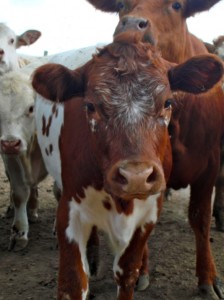Are Our Cows Killing Us? More Reasons to Think of Meat as an Occasional Treat
Bon Appétit’s Low Carbon Diet was launched in 2007 to lower our carbon footprint by decreasing our use companywide of meat and dairy from heavy methane-emitting animals such as beef. It followed our In Balance initiative, in which we asked our chefs to move meat off the center of the plate for health reasons.
We believe steaks and hamburgers, as tasty as they are, are best when enjoyed as an occasional treat. Still need persuading?
This past June, Compassion in World Farming invited Michael Crawford to speak on what he refers to as “the horrors of the modern intensive animal industry.” Crawford is director of the Institute of Brain Chemistry and Human Nutrition at the London Metropolitan University and consults for organizations such as the World Health Organization and the U.N.’s Food and Agriculture Organization. He has been warning about the impacts of factory farming since the 1960s, when he published an article called “Are Our Cows Killing Us?” in The New Scientist.
A passionate speaker, Crawford discussed the impact of factory farming on both the amount and type of fat that’s in the meat we eat today — and furthermore, its health consequences for humans. According to Crawford, factory farming “has resulted in a ninefold increase in fat production compared with the animals that would have been eaten before the enclosures … And that fat is atherogenic, thrombogenic, and carcinogenic, and not particularly good for you. It’s good for making candles, but not much else.”
In short, “this is fat production. It’s not meat production. We’re being conned by the industry.”
Watch the full video of Crawford’s presentation here, or below:
